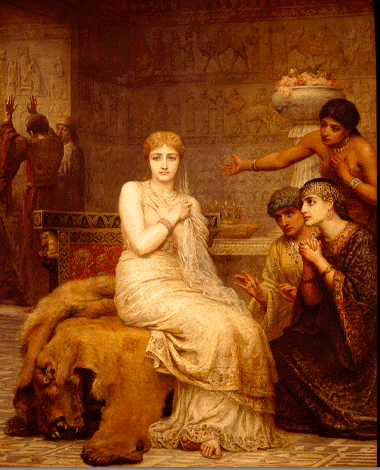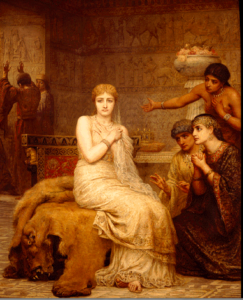And Now for Something a Little Different
It’s Thursday, which means that you’re probably expecting a “Jewish Literary Links” post in this space. But it’s also Purim. And since I recently discovered that a Purim piece I published a few years back is no longer online, I’m going to re-publish the piece [slightly amended from its original version for Jewess magazine] right here. And by the way—you can also find the poem within the piece in Birthright: Poems. Chag sameach
Queen Vashti and the #MeToo Movement

But the queen Vashti refused to come at the king’s commandment…therefore was the king very wroth, and his anger burned in him.—Esther 1:12
These silks, and jewels?
He told me to strip them off
and to show myself, naked,
before his friends.
You can only go so long
as obedient servant
when you are a spouse
with pride, and self-worth.
I was cast out,
the royal stage cleared for another
whose name would live on in light
while mine receded.
Until now.
As we approach the Purim holiday, Jews around the world will be thinking again of the Book of Esther, which anchors our observance. Credited with saving her fellow Jews from destruction in ancient Persia, Esther, wed to King Ahasuerus, is the traditional heroine of the narrative that bears her name. But as those who are familiar with the story will recall, there was a queen before Esther. Her name was Vashti.
A brief summary available on the website of the Jewish Women’s Archive explains: “King Ahasuerus, in the midst of a drinking banquet with his noblemen, summons Vashti to appear before the company with her royal crown upon her head, so that he can show off her beauty. She refuses (her reasons are not given, although the rabbis speculated that she was summoned to appear naked), and the king, enraged, puts her away permanently, thus setting in motion the chain of events that will make the Jewish girl Esther the queen of Persia.”
I wrote the above poem, which I’ve titled “The Book of Vashti,” before the #MeToo movement acquired the momentous meaning it has today. The poem emerged from one of the gatherings of a group of Jewish women with whom I meet regularly to undertake close study of Jewish texts, complemented by rabbinic and other commentaries. All of us are writers; each meeting routinely concludes with a short writing session guided by prompts that connect with the text we’ve examined.
Shortly before Purim 5777/2017, our group revisited the Book of Esther. Our discussion leader for the evening, Sivan Rotholz, shared with us a number of relevant interpretative items, including a poem by Stacey Zisook Robinson (z”l) titled “The Book of Esther.” As we began that session’s writing portion, Sivan suggested that one way to engage further with the story would be to write a poem in the same style—but with Vashti, not Esther, at the center.
So I did.
And then I put the poem away.
Now, I have returned to that poem ahead of the Purim holiday. It seems not only embedded in ancient history, but also emblematic of the voices and stories that have surfaced in our own #MeToo moment as well. When I wrote the poem, I was motivated by an impulse to give Vashti—voiceless in the original text—a chance to speak. Now, however, I see her as a foremother, her experience echoing in so much of what is being shared today.

Hi Erika
You too? Sorry, Erika, you’ve got this wrong. Read this https://blogs.timesofisrael.com/lets-settle-this-for-good-vashti-was-not-a-hero/
Interpretation isn’t wrong. It’s a lens, a perspective—the same as any midrash.
Not cool to use this blog to promote your own, or to tell Erika she’s wrong.
There’s a midrash that says that sons of Hamas became great rabbis. In The Book of Esther, it is clearly written that all the children of Hamas were slaughtered.
Drash is drash!
I can handle disagreement–so long as we all stay agreeable! 😉
And of course, that’s Haman, not Hamas. Silly auticorrect!
I figured–but what an autocorrection!
I’m no Biblical scholar, but I like the poem. History repeats. We revisit common human themes in different places, different times, different situations.